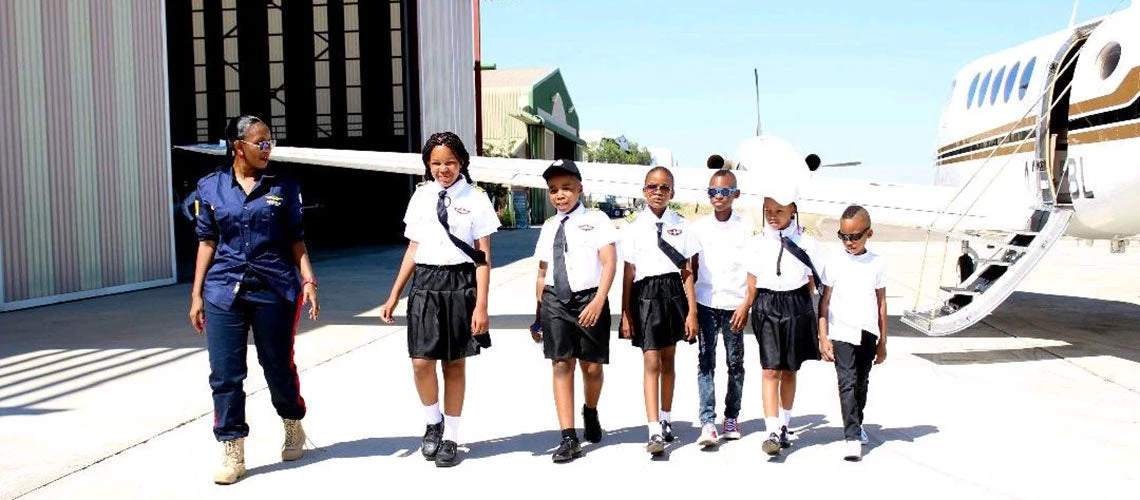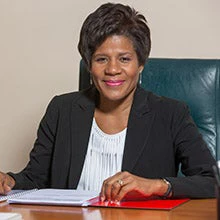 Captain Kgomotso Phatsima coming out of an introductory Inspirational Flight with students at Sir Seretse Khama International Airport, Gaborone, Botswana. Photo: Dare to Dream Foundation
Captain Kgomotso Phatsima coming out of an introductory Inspirational Flight with students at Sir Seretse Khama International Airport, Gaborone, Botswana. Photo: Dare to Dream Foundation
Since moving to Southern Africa in 2019, I have had the great privilege of meeting many impressive women working in Science, Technology, Engineering and Mathematics (STEM) related fields. Among them is Dr. Quarraisha Abdool Karim, a globally renowned scientist at the forefront of research and innovation in HIV/AIDS, worldwide. Her work, through the Center for the Aids Program of Research in South Africa has not only shaped the global response to the HIV pandemic but contributed significantly to COVID-19 (coronavirus) research.
There is also an inspiring group of young women, pursuing ‘non-traditional’ careers for women such as aircraft pilots, physicians, electrical engineers, and computer programmers. They include Botswana’s Captain Kgomotso Phatsima, who started her career in the military and now supports the Dare to Dream Foundation which advances women’s empowerment of young women in aviation and aerospace. In South Africa, Dr. Lindiwe Sidali, the first female cardiothoracic surgeon, and Baratang Miya, a self-taught coder and founder of GirlHype, that provides programming and app development training for girls and young women.
But, sadly, there is still a gross underrepresentation of women in the STEM fields in Sub-Saharan Africa (SSA); as the graph below shows, the share of females graduating from tertiary education engineering fields is below 30% for many SSA countries. Consequently, scientific work and technological innovation are missing women’s invaluable perspectives and critical contributions. This also means that most women will remain in jobs that are likely to be replaced by technology, lower paying or less economically impactful in an increasingly technology-driven world.
Share of Female Tertiary Graduates in Engineering

Why aren’t there enough women in STEM related jobs in Southern Africa?
Existing data shows that globally, there is a “leaky pipeline” leading to few women in STEM careers and Southern Africa is no different. In the case of Botswana, Eswatini, Namibia and South Africa, while girls’ secondary education enrollment is higher than for boys, many of them dropout before completing their secondary education. Of those who complete secondary education, many lack the required proficiencies in numeracy, science and the digital skills required to enroll and/or excel in STEM related programs at the tertiary education level. In South Africa, 50.3% of girls compared to 58.6% boys achieved 30% or higher in Mathematics in the National Senior Certificate Examination. In the Eswatini General Certificate of Secondary Education, 22% of girls achieved a pass grade in Mathematics compared to 35% of boys, while the corresponding figures in Science were 24% for girls and 31% for boys.
In addition, in The Equality Equation Report, gender norms, stereotypes, biases, and sexual harassment emerge as key drivers of low representation of women in male-dominated STEM fields. Gender biases and expectations for different genders, set by families, society, culture, and the media tend to propagate stereotypes, discriminatory practices and policies which deter girls from pursuing STEM careers and also lead to women leaving STEM careers. These challenges limit the chances of girls’ exposure to these fields, which in turn discourages more girls from pursuing STEM careers; creating a vicious circle that must be disrupted!
But what can be done to disrupt the status quo?
The good news is that some of these key drivers of gender disparities in STEM fields are known and are solvable. Moreover, there is no lack of innovative initiatives across Africa targeting some of these root causes. We need to scale up interventions that have proven to be game changers. Some of these focus on improving access to and quality of pre-tertiary education to ensure students, both girls and boys, are learning and acquiring the expected competencies in math, science, literacy and digital skills. They also focus on incorporating gender-responsive and integrated STEM education in the pre-tertiary education curricula; providing mentorship and hands-on training opportunities for girls and young women in collaboration with STEM industries; and promoting flexible and family-friendly workplace policies.
At the World Bank, we are committed to strengthening STEM education, especially as it pertains to girls and young women. In Lesotho, we are supporting the Government to strengthen teaching and learning in Mathematics and Science in junior secondary education through an innovative, technology-driven largely open-source solution, that provides access to high quality, interactive and fun materials for students to learn these subjects. We believe that students will gain an appreciation for science and mathematics if it is taught in an engaging environment filled with lively debate and collaborative problem solving.
Regionally, initiatives such as the Africa Centers of Excellence project, which supports postgraduate programs and applied research across various STEM, agriculture, and health fields, financially incentivizes centers to enroll female students. Spearheaded by African governments, the Partnership for Skills in Applied Sciences, Engineering and Technology (PASET) initiative, has a Regional Scholarship and Innovation Fund, which prioritizes supporting the PhD training of young faculty members and women in applied science and engineering fields.
Without doubt, much has been done, yet much more needs to be done, and more importantly, done now to accelerate the girls and women in STEM agenda! With the proliferation of technology and a rapidly growing global digital economy, it is imperative that deliberate policies are put in place to ensure all students in the region have equal opportunities to acquire STEM-related competencies from early childhood through higher education. Let’s work towards shattering these long-standing barriers and ensure that girls and young women in both rural and urban communities across our region are empowered and inspired to explore future careers in existing and new frontiers of science, technology and innovation.


Join the Conversation